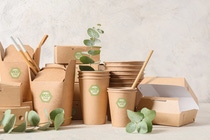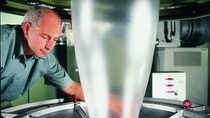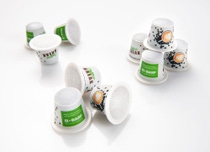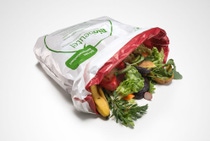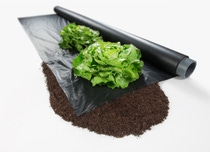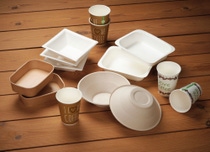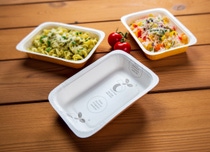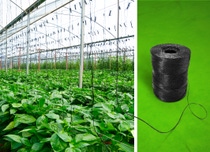Benefits
ecovio®
- is a finished compound
- is certified compostable worldwide
- has a variable bio-based content
- is printable and weldable
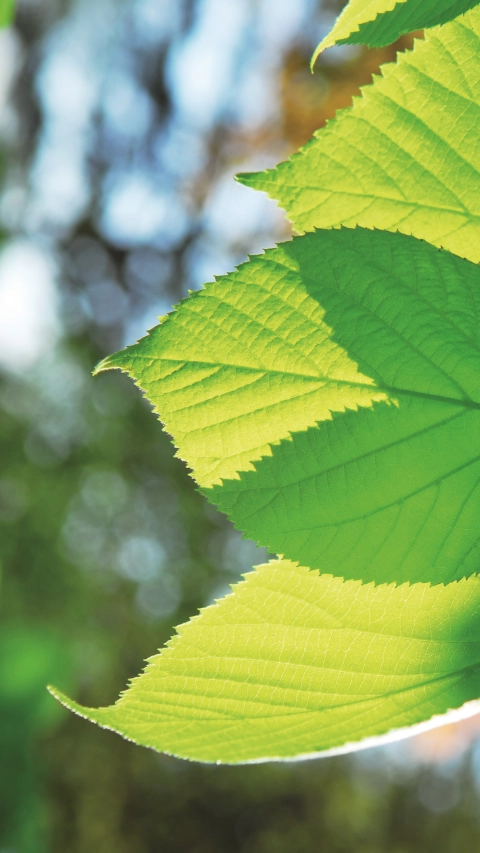
Performance Polymers
ecovio® (PBAT, PLA) – Certified Compostable Polymer With Bio-based Content
ecovio® is a high-quality and versatile bioplastic from BASF. The primary advantages: It is certified compostable and partly bio-based.
Benefits
The main areas of use for ecovio® are plastic films used for e.g. organic waste bags, fruit and vegetable bags, carrier bags with dual-use (first for shopping, then for organic waste) or agricultural films. Furthermore, compostable packaging solutions such as paper-coating, shrink and cling films as well as injection molding and thermoformed products can be produced with ecovio®.
BASF extends its ecovio® portfolio for extrusion coating on paper and board by adding a certified home as well as industrial compostable for any kind of food packaging. The new extrusion coating grade ecovio® 70 PS14H6 is food-contact approved and shows excellent barrier properties against liquids, fats, grease, and mineral oil as well as temperature stability at boiling water (up to 100°C).
Certified home-compostable ecovio® 70 PS14H6 thus enables paper applications like
Its technical benefits:
From hot to frozen, from small sachets to big pouches, whether for supermarkets or take-aways – go circular with paper packaging coated with ecovio® while benefiting from its excellent performance with multiple end-of-life options!
After usage, food packaging made of paper coated with ecovio® 70 PS14H6 can be composted either in garden home compost or industrial composting facilities according to local legislation. The new home-compostable biopolymer thus supports organics recycling and helps close the nutrient loop to achieve a circular economy.
Want to know more?
Here is the full news:
Read on
For more data or a sample, please contact
biopolymers@basf.com
ecovio® is a finished product that can be used by the customer as drop-in solution with standard plastic production procedures. Additional blending is therefore not required.
BASF’s certified compostable biopolymer ecovio® can be used for a wide range of rigid packaging applications in contact with food. Certified compostable plastic parts can be produced on standard plastics manufacturing machines – either for fresh or dry food, with or without barrier properties, with similar mechanical properties to polypropylene (PP), high-impact polystyrene (HiPS) or acrylonitrile butadiene styrene (ABS). BASF offers grades with a range of bio-based content. Thus, rigid packaging made of ecovio® offers the same benefits as conventional plastics packaging while having the added bonus of being certified compostable and thus supporting organics recycling. Several ecovio® gardesd are available for manufacturing applications like coffee capsules, trays, plates, cups, lids, cutlery – and many more.
Bags made of ecovio® are just as high-performing and strong as the ones made of conventional plastics. BASF offers grades with different bio-based content. Thus, ecovio® can be employed to produce bags that can be processed on conventional machines, used by consumers to transport articles and bring a unique sustainability value when collecting organic waste. Studies show that bags made of certified compostable ecovio® increase the collection of organic waste and thus help to return valuable food nutrients to the soil by organics recycling. This closes the loop towards a circular economy for food production: Food waste is diverted from landfill and incineration, resulting in the creation of valuable compost. BASF offers different grades for manufacturing strong and versatile bags like dual-use shopping bags, t-shirt bags, fruit and vegetable bags as well as bags for the collection of organic waste.
Our certified soil-biodegradable grade ecovio® M2351 was especially developed for mulch films used in agriculture and horticulture to increase the yield, speed up harvesting as well as to save water and herbicides. Its big advantage: It is certified soil-biodegradable according to EN17033. This means that mulch films made of the biopolymer ecovio® M2351 are completely and biologically degraded by microorganisms like bacteria and fungi that exist naturally in the soil.
Farmers can simply plough the mulch films made of ecovio® M 2351 back into the ground after harvest. This saves time and money - and it helps to avoid persistent microplastic in agricultural soil which would occur, if farmers used conventional mulch films made of non-biodegradable polyethylene (PE). Thus, certified soil-biodegradable mulch films made of ecovio® M2351 contribute to sustainable agriculture and food production.
BASF developed several certified compostable and mainly bio-based ecovio® grades for extrusion coating on paper, board and other fiber-based substrates – either by mono or multi-layer extrusion without or with adhesives. The paper-coating ecovio® grades show excellent barrier properties against fats, liquids, grease and mineral oil as well as temperature stability at boiling water. They are approved for food contact and characterized by outstanding adhesion to many types of paper and board. Due to its excellent migration barrier properties, ecovio® also enables the use of recycled paper in food applications. The high content of renewable raw materials leads to a reduced material carbon footprint. These tailored ecovio® grades enable paper applications like cups and pots for dairy products, wrappings for sandwiches and cereal bars, bowls and trays for sweets and snacks as well as to-go cups for hot/cold drinks and soup. After usage, food packaging made of paper coated with ecovio® can be composted either in garden home compost or industrial composting facilities according to national legislation, thus extending the end-of-life options for paper packaging.
The Australian food packaging manufacturer Confoil and BASF have cooperated to develop a certified compostable and dual ovenable food tray based on paper. The paper tray is coated on the inside with BASF’s ecovio® PS 1606, a partly bio-based and certified compostable biopolymer especially developed for coating food packaging made of paper or board. The trays called DualPakECO® are certified according to the Australian standard AS4736-2006 and food contact approved according to international requirements. They can be used for ready-to-eat meals like lasagne, curries and stir-fries available as cold or frozen in supermarkets as well as for catering and take-away from restaurants.
The trays extend the end-of-life options for paper-based packaging by being organically recyclable: They can be commercially composted with the organic waste collected in organic waste bins. Thus the new packaging solution supports organics recycling of food residues and food-soiled packaging which increases the diversion of food waste from landfill and incineration.
For more information on the DualPakECO® trays by Confoil, please click here.
For sustainable food production: ecovio® can now also be used to manufacture twines and clips used to grow annual fruit and vegetables in commercial greenhouses. The grades ecovio® T 2206 and ecovio® 60 IA 1552 are certified industrial compostable according to EN13432.
• After harvesting the twines and clips can be collected together with the plant residues and transported to industrial composting facilities where they biodegrade.
• Twines and clips made of ecovio® can be used to help creepers like tomatoes, peppers and cucumbers to climb upwards in greenhouse structures in many climates.
• Tests show the excellent performance of the twines and clips made of ecovio® until the end of the crop cycle.
• Easy drop-in solution for manufacturers.
Please find out more about BASF’s Biopolymers and ecoflex®, another certified biodegradable plastic.
Self-service solutions:

